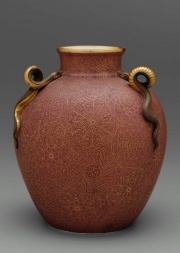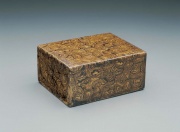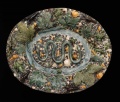Difference between revisions of "Lead glaze"
Jump to navigation
Jump to search
(→Risks) |
|||
| Line 11: | Line 11: | ||
== Risks == | == Risks == | ||
| − | Toxic by inhalation or | + | Toxic by inhalation or ingestion. Skin contact may cause irritation or ulcers.Carcinogen, teratogen, suspected mutagen. |
== Additional Images == | == Additional Images == | ||
Revision as of 11:44, 6 August 2020
Description
A simple, low firing glaze used on soft paste ceramics. Lead glazes may be sprinkled or thinly painted on a clay body. Lead glazes are used on clay that can be fired below its volatilization temperature of about 1150C. Lead glazes produce a lustrous, opaque surface, but they are no longer in common use because of the potential for lead poisoning. Examples of lead salts used as glazes are: lead antimonate (Naples yellow), basic lead carbonate, Lead chromate, Lead oxide, Lead silicate, and Lead sulfate.
Synonyms and Related Terms
glaure au plomb (Fr.); loodglazuur (Ned.); vidrado de chumbo (Port.)
Risks
Toxic by inhalation or ingestion. Skin contact may cause irritation or ulcers.Carcinogen, teratogen, suspected mutagen.
Additional Images
Resources and Citations
- G.S.Brady, Materials Handbook, McGraw-Hill Book Co., New York, 1971 Comment: p. 445
- Richard S. Lewis, Hawley's Condensed Chemical Dictionary, Van Nostrand Reinhold, New York, 10th ed., 1993
- Henry Hodges, Artifacts: An Introduction to Early Materials and Technology, Ronald P. Frye, Kingston, Canada, 1988
- Random House, Webster's Encyclopedic Unabridged Dictionary of the English Language, Grammercy Book, New York, 1997
- Art and Architecture Thesaurus Online, http://www.getty.edu/research/tools/vocabulary/aat/, J. Paul Getty Trust, Los Angeles, 2000


